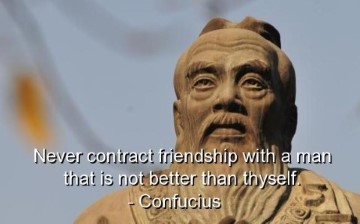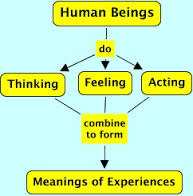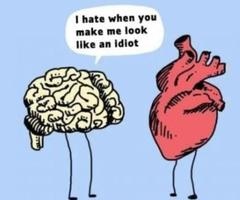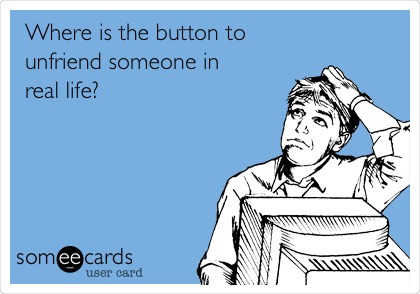-
Home / Why You're My Friend
Was this valuable to you?
other links and editorials from c_prompt
I enjoy writing. It helps me think and organize my thoughts. It prompts me to constantly ask why. The other day, I discussed with someone the difficulty I was having selecting a topic to write about. She suggested friendship - "what you hope to get out of it, the kinds of friends you seek, why you're able to connect with some but not others." "Brilliant," I responded.
Using feelings to think
This is such an important topic, and one I've ruminated over. Humans are social beings. We (instinctually?) crave relationships. Loneliness is often at the root of sadness. Sometimes we even force a closer relationship with almost anyone out of desperation to feel less lonely. Yet, how often do we really consider why someone is our friend or why we choose to befriend another? Having a checklist for the requirements of friendship is about as foreign a concept as describing why we find a piece of art aesthetically pleasing. "Oh, I don't know. I just like the way it looks and the way it makes me feel." The reason is not important - only the resultant feeling. I bet this is how most people think: feelings are THE determining factor in cognition.
Here's the struggle I have with that process: are emotions a proper foundation upon which to base a decision, or are feelings the effect of a different, deeper cause? Do feelings provide important information into the decision-making process or do they muddle your objective evaluation? In other words, are feelings an appropriate tool in cognition?
Generally speaking, I don't make decisions based on feelings, especially on something as important as friendship. If you ask me what I want to do Saturday night, I probably won't have much preference. But if you ask me what I look for in a friend, I am able to rattle off a list of characteristics. Do you consider that odd? Would that oddity prevent you from befriending me? If so, don't you think you're doing subconsciously what I do consciously?
I asked her how she chose her friends. She indicated her close friends are caring, compassionate, honest, funny, and polite. Further, a friend needn't exhibit all these characteristics. Interestingly, she hadn't had a falling out with any friend since primary school ("kids quarrel over such silly things"). When she meets people, she doesn't think about whether they will become friends or not. "It just happens."
Friendships based on reason

My "evaluation" process is much more complex, especially with regard to close friends (cf. genuine but superficial friendships limited to convenience or utility).
If I had to summarize, I look for someone who is consistent with and supportive of my values. What do I value? Achievement. Thinking, especially deep thinking. Peace. Beauty. Hard work. Courage. Creativity. Intelligence. Ability. Innocence. Purity. Truth. Strength. Perseverance. Rationality. The heroic. Integrity. Justice. Fairness. Kindness. Keeping commitments. Self-improvement. To see any one of these characteristics in a person is like a beacon in an otherwise stormy world.
Likewise, I look for behaviors I aim to avoid. Deceit. Supportive of aggressive force. Irrationality. Lack of thought. Faking or ignoring reality. Inconsistencies between what one says and does. Broken commitments. Contradictions. Surface conversations and unimportant chit-chat.

In other words, I discriminate, not based on what people don't control (e.g., skin color, sex), but on what they do: their choices to think and act. When I socialize, I look for these qualities and behaviors. I'll ask questions - sometimes many questions - searching for cracks. I've had too many failed friendships (and relationships in general), so I know what to look for. I know what will cause a breakdown. I'd rather know upfront. When I learn of cracks, they diminish the value of the (potential) friendship and, depending on severity, will lead me to avoid someone entirely.
Is that scrutiny harsh and rigid? Probably. Sigmund Freud believed that most unconscious mental processes were not attributable to the laws of logic, especially the law of contradiction. I don't agree with him. I think it's important to scrutinize and control your mental processes. Bring the subconscious to the realm of consciousness, if you will, by a choice to think. If someone can voluntarily reduce his heart rate (an autonomic nervous system function) by thinking, it stands to reason we can do this with other involuntary autonomous functions. To renounce logic, as Freud does, is to ignore the reality and lessons of my experiences, as if to claim "I had no control - the devil made me do it." Wouldn't that be treasonous to human reason? A person who pushes reason out of his mind or, in Freud's terms, represses mental processes to the unconscious, seems to better describe someone who has a mental illness of insanity. What kind of person would want to befriend an illogical, non-reasoning person?
Re-evaluating the friendship paradigm
Further, to have friendships without a logical basis sounds like a contradiction. I don't understand how people can claim an unconditional friendship. Over the years, people whom I considered friends - some even very good friends - turned their backs on me during a critical period in my life. These weren't just hurtful behaviors - this was betrayal. I was astounded. Beyond astounded. Is this what Facebook has done to the concept of friendship - watered it down so much as to become meaningless? Have we forgotten what it means to be a friend? How do you call yourself a friend when you won't support one in distress? More significantly, how do you call yourself a friend when you actively participate in the devastation of another? If you're honest with yourself, obviously, you can't.
It was during this period that I began to question what friendship means. I often sat on my porch for hours, Scotch in hand, pondering the essence of my values and if they were consistent with those of my (so-called) friends. Previously, I hadn't formally considered values. I did things that felt right, without understanding why they felt right. I befriended anyone whom I considered "nice," "fun," or a "good person." I followed my father's childhood advice: "be friends with everyone; don't differentiate." I spent a lot of time on that porch. I drank a lot of Scotch.
To put it mildly, I was angry, hurt, and depressed. And I was very lonely. Their abandonment at such a critical time brought me to a low I didn't think possible. Although I didn't contemplate suicide, I can empathize with someone who considers it as the only way to stop the pain. I've been close to that cusp, and loneliness brings you closer to the edge. Everyone has a breaking point.
I shut down all contact with most everyone I previously considered as friends. (Well, perhaps that's inaccurate. They abandoned our friendship and I didn't seek repairs.) Only a few remained. Is it really any surprise I now have such a formal (harsh? rigid?) framework for friends? Is it shocking that I look for cracks? Do you consider my behavior irrational?
You might say I've put up a wall so I won't get hurt again. You might claim one bad experience has clouded my ability to trust. Perhaps it's semantics, but I don't look at it that way. My thinking around friendship has matured. I now know specifically what I'm looking for, as well as what I want to avoid. I've chosen these values consciously. Is that really such a bad thing? I've applied my discovered values and enjoyed new friendships. And my demeanor hasn't changed: I'm as open, engaging, approachable, and friendly as previously. Sure, I now have only a few close friends. Would I enjoy more? Of course. Will I compromise quality for quantity? Never again.
Your virtues make you worthy of my feelings

If you're my friend, I've identified a specific virtue in you. I recognize that all friends are not equal - the more virtues, the more intimate and deeper the friendship. But, regardless of our closeness, there is a reason you add value to my life, and I can tell you why in concrete, specific terms; not just abstractly. In the small things you do. In the conversations we share. In the events we enjoy together. In the opportunities you help me to achieve. In the things that make us jointly laugh. If I've noticed a crack, I'm patient, won't make judgments without hard evidence, and will give you the benefit of the doubt to see how it plays out.
My friend, you have meaning in my life. How do I know? When we spend time and experience life together, I feel happy. I don't consider my feelings the only source of information, but I do realize my emotions are a good indicator of an effective cognitive process. So, by all means, pay attention to emotions - they are absolutely relevant to friendship. You're my friend because I value you. Does that make you feel good? It sure feels good to me. And feelings matter.
 This work, excluding any content linked via another source/website, is licensed under a Creative Commons Attribution 4.0 United States License. Permission to reprint in whole or in part is gladly granted, provided full credit is given and references the URL: http:/
This work, excluding any content linked via another source/website, is licensed under a Creative Commons Attribution 4.0 United States License. Permission to reprint in whole or in part is gladly granted, provided full credit is given and references the URL: http:/About relationships
A community for relationships, personal issues, dating, crushes, exes, breakups, infidelity, and other related aspects.




Well, when you're whacked out on cocaine, your mental functions do tend to be a bit off, especially your ability to use logic. From Cocaine: How ‘Miracle Drug' Nearly Destroyed Sigmund Freud, William Halsted